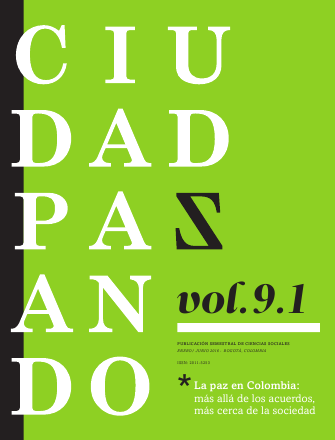DOI:
https://doi.org/10.14483/udistrital.jour.cpaz.2016.1.a01Published:
2016-11-17Issue:
Vol. 9 No. 1 (2016): Enero - junio. La paz en Colombia: más allá de los acuerdos, más cerca de la sociedadSection:
Dossier centralCuidados, desigualdad y mercado. Nociones y experiencias de maternidad en mujeres migrantes empleadas en el servicio doméstico y en mujeres empleadoras de sectores medios y altos en Buenos Aires
Care, inequity and market. Concepts and experiences of maternity in women-mothers migrants’ domestic workers and middle and high class employer’s women in Buenos Aires.
Keywords:
maternity, care, migration, paid domestic work (en).Keywords:
maternidad, cuidado, migración, trabajo doméstico remunerado (es).Downloads
Abstract (es)
A partir de un estudio etnográfico, se describen y analizan las nociones y experiencias de las maternidades en mujeres/madres migrantes empleadas domésticas en el área metropolitana de Buenos Aires, y en mujeres profesionales trabajadoras que las contratan para algunas actividades algunas actividades de cuidado y atención de sus hijos. En particular, se abordan las características, tensiones, conflictos o correspondencias que, desde las perspectivas de las madres, existen entre los modelos normativos de la maternidad y las experiencias de cuidado, atención y contención, para lo cual se tuvieron en cuenta
las lógicas diferenciales que las condiciones sociales y económicas imprimen en ellas. Señalamos la existencia de una reproducción estratificada en la que clase, género y nacionalidad aparecen como elementos diferenciadores de múltiples maternidades. Sin embargo, comparten la resolución privada de las
actividades de cuidado: mercantilización para unas, familiarización para otras, a través de redes de cuidado trasnacionales.
Abstract (en)
Based on an ethnographic study this paper analyzes and describes the concepts and experiences of maternity in both women-mothers migrants who are domestic workers in the Metropolitan Buenos Aires area and the professionals working women who employ them. We analyze the characteristics, tensions, conflicts or correspondences that arise from the perspectives of the mothers between the normative models of motherhood, affection and experience of care, attention and containment, considering the differential logic that social and economic conditions printed on them. We argue the existence of a stratified reproduction in which class, gender and nationality appear as distinguishing features of the various maternity experiences, and however, they share a common resolution of private care activities. For some it is the commodification and familiarization, for the others the transnational networks of care.
References
Colen, S. (1995). Like a Mother to them. Stratified Reproduction and West Indian Childcare Workers and Employers in New York. En: F. Ginsburg y R. Rapp (eds.). Conceiving the New World Order. The Global Politics of Reproduction (pp. 78-102). Berkeley: University of California Press.
Instituto Nacional de Estadística y Censos (Indec) (2014). Encuesta Per- manente de Hogares (EPH). Disponible en http://w w w.indec.gov.ar/ bases-de-datos.asp.
Gorban, D. (2012). Empleadas y empleadoras. Tensiones de una relación atravesada por la Ambigüedad. Revista Española de Investigaciones Sociológicas, 140, 29-48.
Hays, S. (1998). Las contradicciones culturales de la maternidad. Barcelo- na: Paidós.
Herrera, G. (2004). Género, familia y migración en el Ecuador. En N.
Fuller O. Jerarquías en jaque: estudios de género en el área andina (pp.
-406). Lima: Red para el Desarrollo de las Ciencias Sociales en el Perú.
Hochschild, A. (2000). Global Care Chains and Emotional Surplus Va- lue. En: W. Hutton y A. Giddens (eds.). On The Edge: Living with Global Capitalism (pp. 130-146). Londres: Jonathan Cape.
Hondagneu-Sotelo, P. (2007). Domestica: Immigrant Workers Cleaning and Caring in the Shadows of Affluence. California: University of Ca- lifornia Press.
Hugo, G. (2000). Migration and Women’s Empowerment. En: H. Presser y G. Sen (ed.). Women’s Empowerment and Demographic Processes. Mov- ing Beyond Cairo (pp.287-317). Nueva York: Oxford University Press.
Kuznesof, E. (1993). Hisotria del servicio doméstico en América Hispana (1942-1980). En: E. Chaney y M. García. Muchacha, cachifa, criada, em- pleada, empregadinha, sirvienta y... más nada: trabajadoras domésticas en América Latina y el Caribe (pp. 25-40). Caracas: Nueva Sociedad.
López M., C. y Bestard. D.J. (2013). Maternidades, procreación y crianza en transformación. Barcelona: Bellaterra.
Organización Internacional para las Migraciones (OIM) (2012). Panora- ma migratorio de América del Sur. Buenos Aires: Oficina Regional para América del Sur.
Ragoné, H. (2000). Ideologies and Technologies of Motherhood: Race, Class, Sexuality and Nationalism. Nueva York y Londres: Routledge.
Tienda, M. y Booth, K. (1991). Gender, Migration and Social Change.
International Sociology, 6, 51-72.
Wainerman, C. (2005). La vida cotidiana en las nuevas familias: ¿una revo- lución estancada? Buenos Aires: Lumiere.
Winnicott, D. (1960). The Theor y of the Parent-Infant Relationship.
Int. J. Psycho-Anal., 41, 585-595.
How to Cite
APA
ACM
ACS
ABNT
Chicago
Harvard
IEEE
MLA
Turabian
Vancouver
Download Citation
License
The Ciudad Paz-ando Journal (RCP) is an open access publication, without economic charges for authors or readers, whose biannual publications are made under the terms of the Creative Commons Attribution - Non-commercial - Share the same License (CC-BY-NC -SA 2.5 CO), with which others may distribute, remix, retouch, and create from the work in a non-commercial way, as long as they give credit and license their new creations under the same conditions.
The copyright holder is Ciudad Paz-ando journal, retaining all rights without restrictions, respecting the terms of the license regarding the consultation, download and distribution of the material.
When the work or any of its elements are in the public domain according to the applicable current law, this situation will not be affected by the license.
Likewise, we encourage authors to deposit their contributions in other institutional and thematic repositories, with the certainty that culture and knowledge is a good for all and for all.

